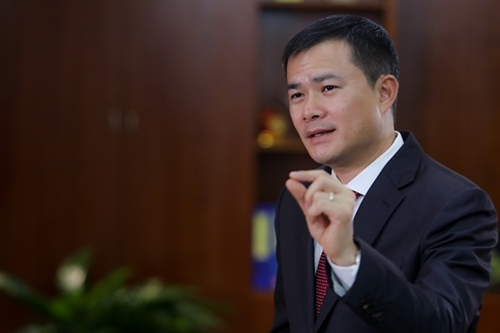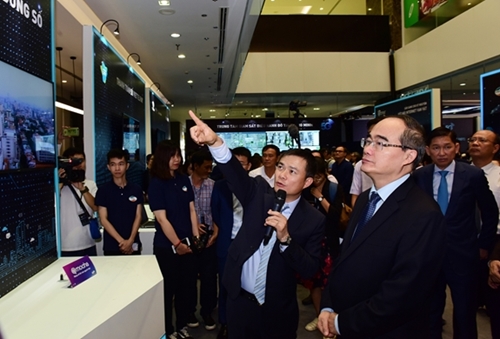Reporter: After the launch of the services in Ward 12 of District 10, offering subscribers with applications and utilities built on the 5G platform, what is Viettel going to do with the technology?
Senior Colonel Tao Duc Thang: In January, 2019, Viettel was granted with the license for the trial run of the 5G network on a limited scale. The test run aimed to evaluate technical capabilities including the coverage area, compatibility, frequency noise, etc. For example, the 3500Ghz – 3900Ghz frequency has its effects on satellites while the 2600Ghz – 2700Ghz frequency may be affected by rain and fog. The license is valid for one year.
    |
 |
|
Viettel's Deputy Director General Tao Duc Thang |
Recently Viettel has tested the operation of the 5G technology in Hanoi and Ho Chi Minh City as licensed by the Ministry of Information and Communications. However, with 10 base transceiver stations (BTS) in Ward 10, only subscribers with 5G-supported smartphones can experience the services. Apart from that, Viettel also offers products and applications built on the 5G platform. According to the road-map, a frequency auction must be carried out before the expiration of the license. Viettel cannot announce anything now, as it is waiting for the auction to be held by the Ministry of Information and Communications. However, if the auction is not conducted in 2020, it is possible that Viettel will put its 5G services into commercial exploitation in mid or late 2020.
Reporter: Could you please reveal information about cooperation with partners (equipment suppliers) during the implementation of the 5G technology of Viettel?
Senior Colonel Tao Duc Thang: In the North, Viettel has just piloted the technology of Ericsson. In the South, that of Nokia Acatel is used. The two companies have been strategic partners of Viettel since its early days.
The number of BTSs will be based on the features of the 5G technology, which are big data, high speed, and low time lag. Low time lag makes it compatible for application to the operation of smart factories, autonomous cars, and more. Viettel will expand the services to provinces and cities with high demand for data capacity. As for data, they are provided just after the installation. Therefore, not just Hanoi and Ho Chi Minh City, in the next several years, Viettel’s 5G technology will cover localities and areas with high demand for the services, such as factories, industrial parks, automation sector, populous and industrial cities and provinces. At present, the 4G network has covered up to 95% of the country’s population and it works well. Therefore, the 5G network will not cover the whole population.
Reporter: What are difficulties and challenges Viettel faces during the construction of the 5G network?
Senior Colonel Tao Duc Thang: First, frequency is one of the important thing, as Viettel cannot decide on it. Second, the 5G equipment consumes huge amount of power. One 5G device can eat up all the power resource of 2G and 3G equipment in combination, even more. More power means higher cost, which requires more subscribers. One more challenge is that infrastructure for a 5G platform is different form a telecom one. Viettel cannot provide all applications and has to rely on other suppliers. The 5G network employs high-frequency bands, leading to its low penetration capacity through walls. Therefore, it requires more BTSs with higher density. The installation of a passive network, posts, and stations is the next challenge for Viettel.
At present, it is not suitable for the initial charges of 5G services to reduce. The charges can be said to be very expensive while equipment cannot be delivered right after the order is placed. Therefore, it is hard to estimate the charges. If the time is ripe for 5G services, then charges can be calculated. The 5G network offers a speed of 15 Gb/s, 50 times higher than that of the 4G network. More subscribers means the bandwidth must be updated.
    |
 |
|
Senior Colonel Tao Duc Thang introduces Viettel's 5G technology to delegates. |
Reporter: Could you elaborate on the development targets of Viettel in the coming years after the 5G network is put into commercial operation?
Senior Colonel Tao Duc Thang: Every company wants to boost their development whenever they introduce a new technology. For example, when the time was ripe for the 4G technology, it developed very vigorously. However, at present, data usage is on the rise due to the fact that people spend more time on social media. That leads to the reduction in the usage of OTT and image chatting and voice messaging and also calling time. Viettel is now developing its 5G services in the context that it has a lot of hotspots. Therefore, it has been developing naturally.
Reporter: Thank you very much!
|
According to the GSMA, Viettel is now the only representative of Vietnam in the top 50 mobile service providers in the world successfully in developing the 5G technology. At present, there are only 10 countries in the world commercially exploiting the 5G technology. They are the Republic of Korea, Japan, China, the United States, Australia, the United Kingdom, Spain, Sweden, Norway, and Russia.
In its fourth stage of development, Viettel has set the target to take the lead in implementing a digital society in Vietnam.
|
Translated by Huu Duong